
Differences in the Old Greek Version of Daniel (Chapter 6)
DaniEl in the Lions’ Den
This chapter of the ‘Old Greek’ version of Daniel contains 28 verses. Of these, 23 have differences.
The Old Greek is better, and may expose possible later corruptions of the Masoretic Text. The Old Greek sounds more historical, but the Masoretic reads more like a bedtime story.
Also, once again, the Greek text is more coherent, and it contains very important extra details. The Masoretic Text, in contrast, is less detailed, and the few extra details it does have are not as important.
Oddities in the Masoretic Text
For example, in the Greek text we know that we had two main schemers, two young men, whereas the Masoretic Text says it was all the satraps, which seems unlikely.
The Masoretic Text also adds the detail that the schemers looked to find something against DaniEl ‘in the law of his God’. Yet the Mosaic Law does not mandate prayer, not even once per day. Sure, that extra statement would have made sense if they had passed a law to force people to pray to the king, or to a false god, or to some idol (like happened to the three Hebrews in chapter 3), but they didn’t!
So the extra detail in the Masoretic Text does not make sense, and it’s absence from the Greek is right and proper.
The Masoretic Text also contains more unnecessary repetition, such as how the king was repeatedly reminded of how laws can’t be revoked.
The overall impression is that the Masoretic Text has been rewritten to make it more dramatic (e.g. the lions eating them before they hit the ground) and to emphasise the central point of how evil the plotters were, even removing the king’s agreement that the law was indeed unchangeable.
Historical details
Finally, the last verse in the Old Greek is very helpful historically. It shows that there was a change in succession with Darius dying, DaniEl being in charge, and then Cyrus taking over. This would align with secular history that still has Cyrus away on conquests, even after Babylon was conquered.
The Masoretic Text doesn’t seem to care about such details, reading like less of a serious historical account.
Is that because the Old Greek text preserves a better, earlier, original? Or is it because the Greek text was cleaned up by the translator, who also added historical details to improve it? We don’t know.
Anti-Christian edits?
What about potential tampering with the Masoretic Text to discredit Christians? Well, there’s a couple of contenders.
Firstly, in the Old Greek version, Darius (a foreigner and pagan) does not merely praise God, but actively swears to start worshipping Yahweh until he dies. Could that have been seen as supporting the Christian idea that non-Jews can come to know God without converting to Judaism? Perhaps. If so, it was erased from the Masoretic Text.
Secondly, the Masoretic Text adds the detail that God’s kingdom endures forever and shall not be destroyed. This could have been added as a way of discrediting the Christian idea that God set up a new kingdom in the 1st century AD and made Jesus its king. By putting a very similar-sounding statement here, but it being fulfilled in the 6th century BC (centuries before Christianity), it may be added to suggest that God’s kingdom was already set up and was not new.
This is especially meaningful since the physical kingdoms of Israel and Judah were not in existence at this time either, suggesting that ‘God’s kingdom’ was something spiritual that was already in operation long before Jesus turned up.
You could imagine Pharisees saying to the early Christians:
‘Bah! Don’t you know that the scriptures say that God’s kingdom was already in operation 600 years ago? Look! It’s here in Daniel! It has nothing to do with your false Messiah!’
Yet if they did make this change, then they introduced a contradiction with the prophecy in Daniel 2, which states the kingdom will be set up in the future. Obviously, that contradiction does not exist in the Old Greek version.
Of course, this is speculation, we can’t prove any of this, but it’s fun to think about.
Differences
6:1
The Old Greek starts off by saying that Darius is ‘advanced in years,’ whereas the Masoretic Text doesn’t say that, instead giving his exact age at the end of the previous chapter.
6:2
The Old Greek doesn’t have the extra detail in the Masoretic Text which says the administrators were appointed so the king ‘would not suffer loss’. It’s not clear what that means, and translators can’t seem to agree either.
It’s almost like the Masoretic text feels it needs to justify why the king wants to set up administrators. Yet isn’t it obvious that a king of a vast empire would want to set up administrators? It seems so unnecessary to give a reason. There must be thousands of reasons!
Perhaps the addition is meanigless, but it looks like chapters 4, 5, and 6 all seem to have additions and differences in the Masoretic Text to make the accounts sound more like bedtime stories, and this is another one.
6:3
The Old Greek of this verse is much longer than the Masoretic version.
It mentions DaniEl’s purple robes, and how he was put in charge of the other two chief administrators, and goes on to specify that he has authority over 127 satraps. Verse 1 previously said it was 120, but that may be a round number.
It’s not clear which version added or removed these details, or why.
No words from the Dead Sea Scrolls survive of this portion, which is a shame.
6:4
The Old Greek version is more specific in saying that it was the other two main administrators who schemed against him, whereas the Masoretic Text makes it sound like it was everyone — the satraps and the administrators, which is over 120 people. The Old Greek text also specifies that the two schemers were young men.
Again, the Masoretic Text is adding details to make the story sound more dramatic, and it’s interesting that the reference to the young men had to go to make it fit.
6:5 (i)
The Old Greek version simply says that the two schemers came up with the 30-day no-praying law, and explicitly says it was to get DaniEl thrown to the lions. That is not mentioned in this part of the Masoretic Text.
6:5 (ii)
The Masoretic Text says that the schemers sought to find something against DaniEl in the law of his God. This is an odd statement, because the Mosaic Law does not mandate any prayers!
If their law was to force people to pray to the king or to something else, then yes, that would have indeed gone against ‘the law of his God,’ but the law they created didn’t force DaniEl to break any part of the Mosaic Law. So it makes no sense.
Again, we find the Old Greek text being more historically accurate, and the Masoretic version being more sensational and innacurate. This pattern continues.
6:6
The Old Greek version just has the two men approaching the king. The Masoretic version has all 120+ people showing up to the king.
6:7-9
The Old Greek version just has the king establishing their 30-day law. However, the Masoretic version also gives the detail here that Mede and Persian laws can’t be changed, which appears again later.
6:10-11
No important differences.
6:12
The Old Greek version is much longer, adding how the two schemers reminded the king how he can’t do several things:
- Can’t revoke the law,
- Can’t reconsider the law,
- Can’t even water down the law they had passed.
This is much more thorough than the Masoretic version, which just says the king can’t revoke the law.
The Old Greek is more intellectually satisfying here, because obvious questions are answered, like ‘Why can’t the king just say that it doesn’t apply to government officials?’ or ‘Why can’t he pass an ammendment?’ and so on.
These are the sorts of questions adults would ask. Yet again, the Masoretic version sounds more like a bedtime story, and the Old Greek is more like a serious historical account.
6:13
Now the Masoretic Text is a little longer, where the schemers suggest to the king that DaniEl has shown ‘contempt’ for the king by disobeying the 30-day law. The Old Greek version doesn’t mention ‘contempt,’ and has the men say that ‘we caught your friend’.
6:14
The Old Greek version has the king actually verbally agree that, according to the law, yes, DaniEl would indeed have to be thrown to the lions. The Masoretic version does not mention this thoughtful admission. The pattern continues!
6:15
The Old Greek version just describes how the king couldn’t free DaniEl from the situation, which is an obvious question that an audience would ask. Whereas the Masoretic Text instead has the schemers remind the king (again) that the law can’t be changed.
6:16-17
No important differences.
6:18
The Greek text says the king was fasting and grieving over DaniEl (believing he was dead), but the Masoretic Text says that he fasted, had no musicians entertain him that night, and couldn’t sleep.
Then the Greek text adds a detail: that God was ‘watching over’ DaniEl and had ‘shut the lions’ jaws’ so DaniEl was not harmed. The Masoretic Text doesn’t mention this here.
6:19
When the Old Greek version describes the king rushing to the lions’ den, it adds the detail that the ‘satraps’ went with him.
The Masoretic Text doesn’t mention this, possibly because earlier (in 6:4) it implicated all the satraps in the plot. If someone really did change these details, at least they made sure they were consistent.
6:20
The Old Greek has the king also shouting down to DaniEl to ask if he’s been harmed. The Masoretic Text doesn’t mention this.
6:21
DaniEl does not say ‘O live forever, o king’, like it says in the Masoretic Text.
6:22
The Old Greek version has DaniEl say more in response to the king’s question. He insists that he’s not incompetent and hasn’t done wrong, then he tells the king that he’s been tricked.
This is a logical response to all the events.
Yet the Masoretic Text doesn’t contain these extra words, being overall a much simpler account.
6:23
The Old Greek text again mentions that lots of other people (‘powerful men’) were with the king (the satraps) when DaniEl was brought out of the pit. The Masoretic Text instead adds a detail of how pleased the king was to see DaniEl alive.
6:24
The Old Greek does not contain the detail present in the Aramaic that DaniEl’s accusers were pounced on by the lions before even hitting the ground.
The Masoretic Text is, like the previous chapters, written simpler, more dramatically, and less historically.
6:25
The Old Greek version of the king’s letter to the whole empire does not start with ‘May you have peace.’
6:26
Continuing the king’s letter, the Old Greek has the king say that DaniEl’s God is eternal. The Masoretic Text instead has him say that God’s ‘kingdom endures forever and shall not be destroyed.’
So:
- The Old Greek is talking about God Himself.
- The Masoretic Text is talking about God’s rulership,
That’s a deliberate change, but to which version? Nobody knows.
But… If we were to guess, we know exactly which side we’d choose!
Hebrew scribes famously made a series of at least 18 changes to avoid expressions that could be seen as disrespectful to God (the changes are all known and called the Tiqqune Soferim), so we know they are inclined to make changes like this. Perhaps they saw it as disrespectful for a pagan king to speak of God in that way.
6:27
Here there are more differences with the king’s letter.
The Old Greek text is entirely different in this verse. King Darius says that he himself will now worship DaniEl’s God, because handmade idols can’t save anyone. The Masoretic Text doesn’t mention this at all, instead giving a generic statement about how DaniEl’s God performs signs.
Perhaps the idea of a pagan king worshipping Yahweh was seen as disrespectful. Or, and this is just a theory, perhaps it was seen as a way of supporting the Christian idea that non-Jews can come to know God without converting to Judaism.
6:28
This last verse is also quite different, and gives more historical details. The Old Greek text specifies that Darius later dies, and that DaniEl was temporarily assigned to run the empire until Cyrus the Persian took direct control (presumably when he returned from his conquests).
The Masoretic Text doesn’t mention any of this, simply saying that DaniEl prospered until Cyrus came.
So yet again, the Masoretic Text is less detailed, reading more like a bedtime story, and the Old Greek is more detailed, and sounds more like an historical account.
Contents
 Introduction to
Introduction to
Differences in Daniel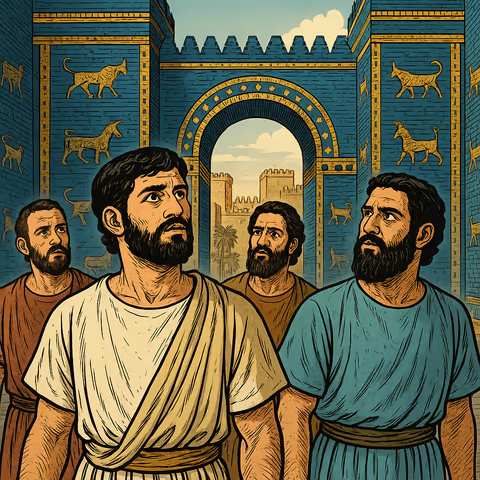 Differences
Differences
in Chapter One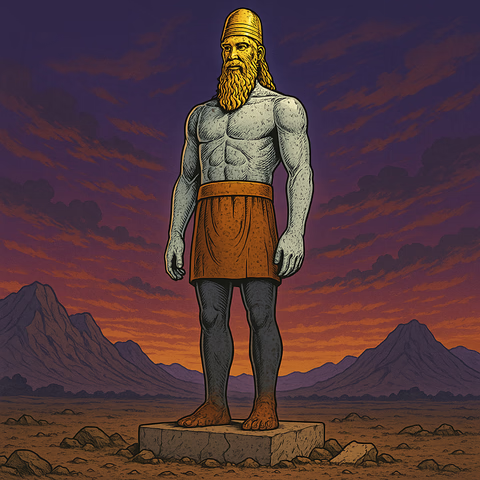 Differences
Differences
in Chapter Two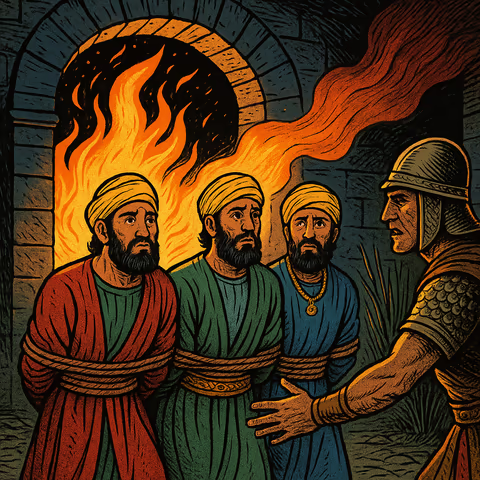 Differences in
Differences in
Chapter Three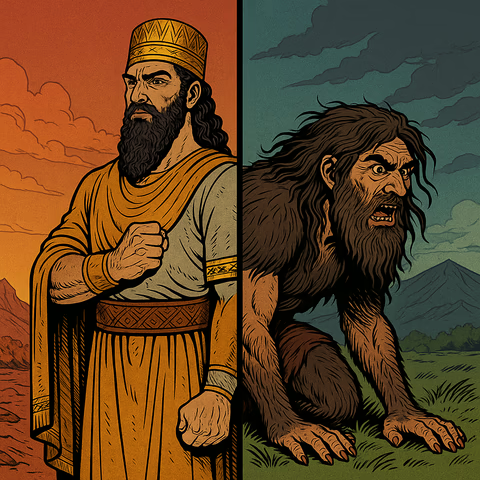 Differences
Differences
in Chapter Four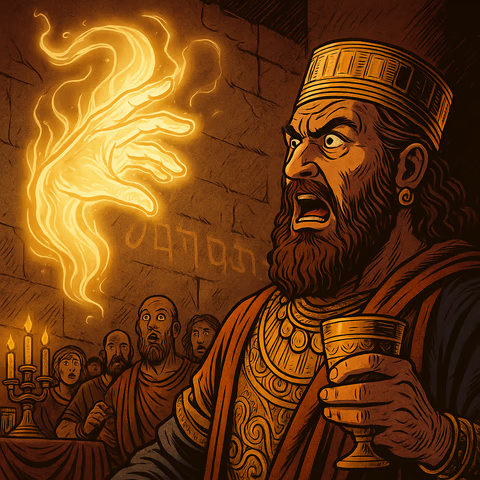 Differences
Differences
in Chapter Five Differences in Chapter Six
Differences in Chapter Six Differences in
Differences in
Chapter Seven Differences in
Differences in
Chapter Eight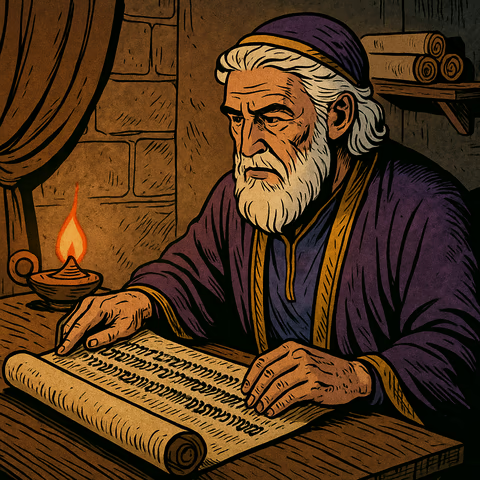 Differences
Differences
in Chapter Nine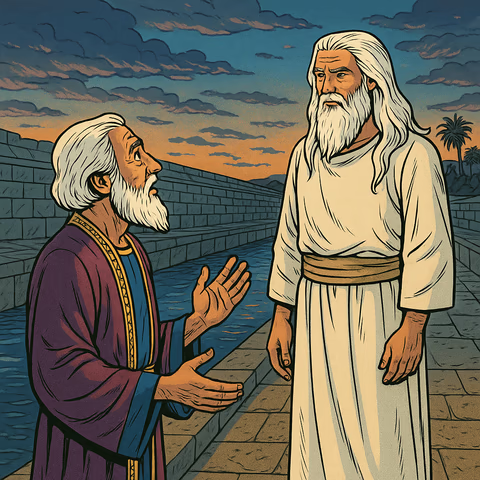 Differences
Differences
in Chapter Ten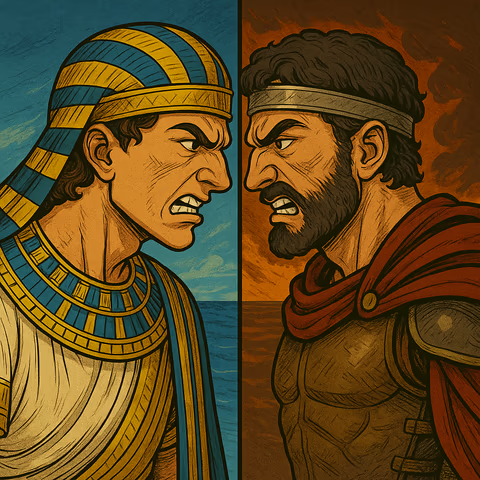 Differences in
Differences in
Chapter Eleven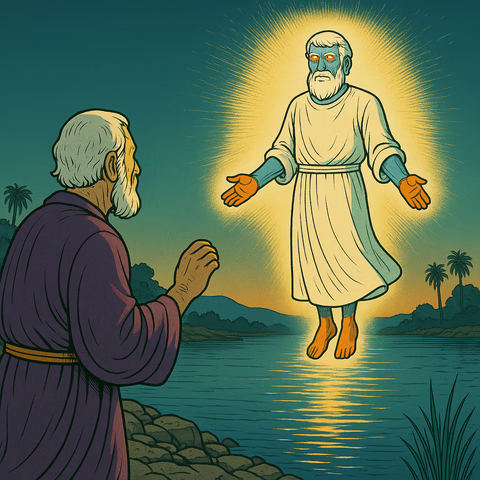 Differences in
Differences in
Chapter Twelve